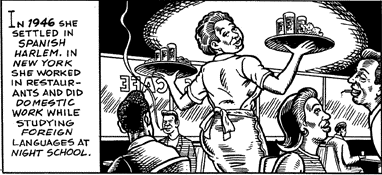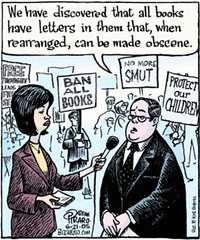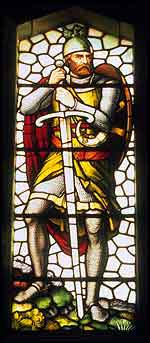Presenting PresbyAfter attending the FORC synod and spending time listening/talking to my Pastor, last week I picked up my copy of the Westminster Confession to see what was in it regarding Presbyterian polity. I was surprised that there is absolutely nothing in the confession about local church government or the ordering of the "kirk." Chapters 25 through 31 deal with the nature of the Church, the communion of the saints, the sacraments, church discipline, and the authority/lawfulness of the calling of broader assemblies. Yet there is nothing about Presbyterianism vs. Episcopacy, or, more specifically within Presbyterianism, two-office or three-office views. I'm not sure why this is the case, but I'd like to think that it's because the Westminster divines were not willing to make Presbyterial government an article of faith.
After failing to find anything in the confession, I looked at the subordinate documents and there found the
"The Form of Presbyterial Church-Government" which was a product of the assembly at Edinburgh, not Westminster. It was this document that the Scottish Kirk subscribed to as far as settling the nature of church government. (I just think that it's interesting to note that it is the product of Scottish church officers in Edinburgh and not the work of the English church officers gathered at Westminster). So, even though I haven't looked at any other documents yet, I now have a better understanding of the form of church government that the Scottish church adopted, and which has affected all subsequent Presbyterian bodies.
The "Form" basically takes a three-office view, though that term may be a bit simplistic because the Form also breaks up roles within offices.
The office of Presbyter is broken up into Pastor and Teacher (or Doctor), yet the Form recognizes that these roles can and indeed must overlap. The distinction is meant to emphasize that there are different strengths and gifts given to different men in the office. Yet there are not two offices of Presbyter, but one.
The Pastor is primarily responsible to:
- pray for and with his flock, as the mouth of the people unto God, where preaching and prayer are joined as several parts of the same office. The office of the elder (that is, the pastor) is to pray for the sick, even in private, to which a blessing is especially promised; much more therefore ought he to perform this in the publick execution of his office, as a part thereof.
- read the Scriptures publickly
- feed the flock, by preaching of the word, according to which he is to teach, convince, reprove, exhort, and comfort.
- catechise, which is a plain laying down the first principles of the oracles of God, or of the doctrine of Christ, and is a part of preaching.
- dispense other divine mysteries.
- administer the sacraments.
- bless the people from God
- take care of the poor.
- And he hath also a ruling power over the flock as a pastor
The Teacher, on the other hand, is primarily one that “excels in exposition of scripture, in teaching sound doctrine, and in convincing gainsayers.”
Though both Pastors and Teachers are both recognized as Elders (Presbyters), equal in authority, there does seem to be a stress in the idea that Pastors exhibit more in the role of oversight (overseer=bishop), while the Teacher’s primary role seems to be teaching (surprise!). Nevertheless, they occupy the same office and the Pastor does not have authority over the Teacher and is not excused from the role of teaching, while the Teacher must practice oversight as well, especially if he is the only officer in the local congregation.
“… where is but one minister in a particular congregation, he is to perform, as far as he is able, the whole work of the ministry”
In addition to the ordained office of Presbyter/Bishop, the Form introduces what I would call elders with a little ‘e’. These elders are non-ministerial men in the local congregation with “gifts for government, and with commission to execute the same” in the government of the church. This position is analogous to those “elders of the people” under the Old Covenant who were “joined with the priests and Levites in the government of the church.”
Finally, the Form presents deacons as “distinct officers in the church … whose office it belongs not to preach the word, or administer the sacraments, but to take special care in distributing to the necessities of the poor.”
“For officers in a single congregation, there ought to be one at the least, both to labour in the word and doctrine, and to rule”
There needs to be at least one officer (Presbyter) in a local congregation. This may be surprising to those that describe Presbyterianism as rule by a plurality of Elders (big ‘e’ or little ‘e’ elders) at the local level. This is true to a certain extent, because “It is also requisite that there should be others to join in government” at the congregational level. “And likewise it is requisite that there be others to take special care for the relief of the poor.” So, the local congregation has to consist of at least one ordained Presbyter/Bishop and is required to have layman elders to join in government and deacons to care for the poor, the number of which is “to be proportioned according to the condition of the congregation.”
That is the basic government, according to the Form, of a local congregation. According to the Form, however, the local congregation is not really a full “church.” This may sound strange to us at first, but there are Biblical examples given to support this distinction.
According to the Form, “It is lawful, and agreeable to the word of God, that the church be governed by several sorts of assemblies, which are congregational, classical, and synodical.”
Congregational Assemblies consist of the ruling Officers of a particular Congregation.
Classical Assemblies consist of a presbytery. “A presbytery consisteth of ministers of the word, and such other publick officers as are agreeable to and warranted by the word of God to be church-governors, to join with the ministers in the government of the church.”
Here’s where it gets interesting, at least to me… (I’m going to quote a huge chunk here)
(Quickly, though, the third type of assembly is Synodical: “Synodical assemblies may lawfully be of several sorts, as provincial, national, and oecumenical.”)
The following is concerning “Classical Assemblies” –
_______________________________________
The scripture doth hold forth, that many particular congregations may be under one presbyterial government.
This proposition is proved by instances:
I. First, Of the church of Jerusalem, which consisted of more congregations than one, and all these congregations were under one presbyterial government.
This appeareth thus:
First, The church of Jerusalem consisted of more congregations than one, as is manifest:
1st, By the multitude of believers mentioned, in divers [places], both before the dispersion of the believers there, by means of the persecution, and also after the dispersion.
2dly, By the many apostles and other preachers in the church of Jerusalem. And if there were but one congregation there, then each apostle preached but seldom; which will not consist with Acts vi. 2.
3dly, The diversity of languages among the believers, mentioned both in the second and sixth chapters of the Acts, doth argue more congregations than one in that church.
Secondly, All those congregations were under one presbyterial government; because,
1st, They were one church.
2dly, The elders of the church are mentioned.
3dly, The apostles did the ordinary acts of presbyters, as presbyters in that kirk; which proveth a presbyterial church before the dispersion, Acts vi.
4thly, The several congregations in Jerusalem being one church, the elders of that church are mentioned as meeting together for acts of government; which proves that those several congregations were under one presbyterial government.
And whether these congregations were fixed or not fixed, in regard of officers or members, it is all one as to the truth of the proposition.
Nor doth there appear any material difference betwixt the several congregations in Jerusalem, and the many congregations now in the ordinary condition of the church, as to the point of fixedness required of officers or members.
Thirdly, Therefore the scripture doth hold forth, that many congregations may be under one presbyterial government.
II. Secondly, By the instance of the church of Ephesus; for,
First, That there were more congregations than one in the church of Ephesus, appears by Acts xx. 31, where is mention of Paul's continuance at Ephesus in preaching for the space of three years; and Acts xix. 18,19,20, where the special effect of the word is mentioned; and ver. 10. and 17. of the same chapter, where is a distinction of Jews and Greeks; and 1 Cor. xvi. 8,9, where is a reason of Paul's stay at Ephesus until Pentecost; and ver. 19, where is mention of a particular church in the house of Aquila and Priscilla, then at Ephesus, as appears, Acts xviii. 19,24,26. All which laid together, doth prove that the multitude of believers did make more congregations than one in the church of Ephesus.
Secondly, That there were many elders over these many congregations, as one flock, appeareth.
Thirdly, That these many congregations were one church, and that they were under one presbyterial government, appeareth.
__________________________________
So, according to the Form above, churches exist on the city-level, and individual churches can, and frequently do, consist of multiple congregations. The whole church, on the city-level, is ruled by a presbytery. This seems to be the heart of the difference between Presbyterial government and Episcopal government, that the church on a broader level (diocese, in Episcospeak) is governed by a presbytery (see above definition) instead of by a single bishop, occupying an office separate and above the other presbyters.
That’s my brief interaction with and summary of “The Form of Presbyterial Church-Government.”
I find interesting and convincing the idea of a single church consisting of multiple congregations. I find the argument for lay elders less convincing and I’m not sure where I stand on the matter yet.
Please, if I’ve made any errors above in summarizing this position, please correct me.
Here’s a good place for a disclaimer, too. If it’s not obvious, I should let all know that the above position is not necessarily my own position. I’ve been settled (relatively so) on many matters related to Reformed Dogma and Doctrine for a few years now, but I am very uncertain and lacking in knowledge in regards to polity.
Anyone that wants to make suggestions regarding books/articles/essays on forms of Episcopal or Presbyterial church government, please do so.
Somewhat related:
Read Joel Garver’s essay
Catholicity and Authority.







